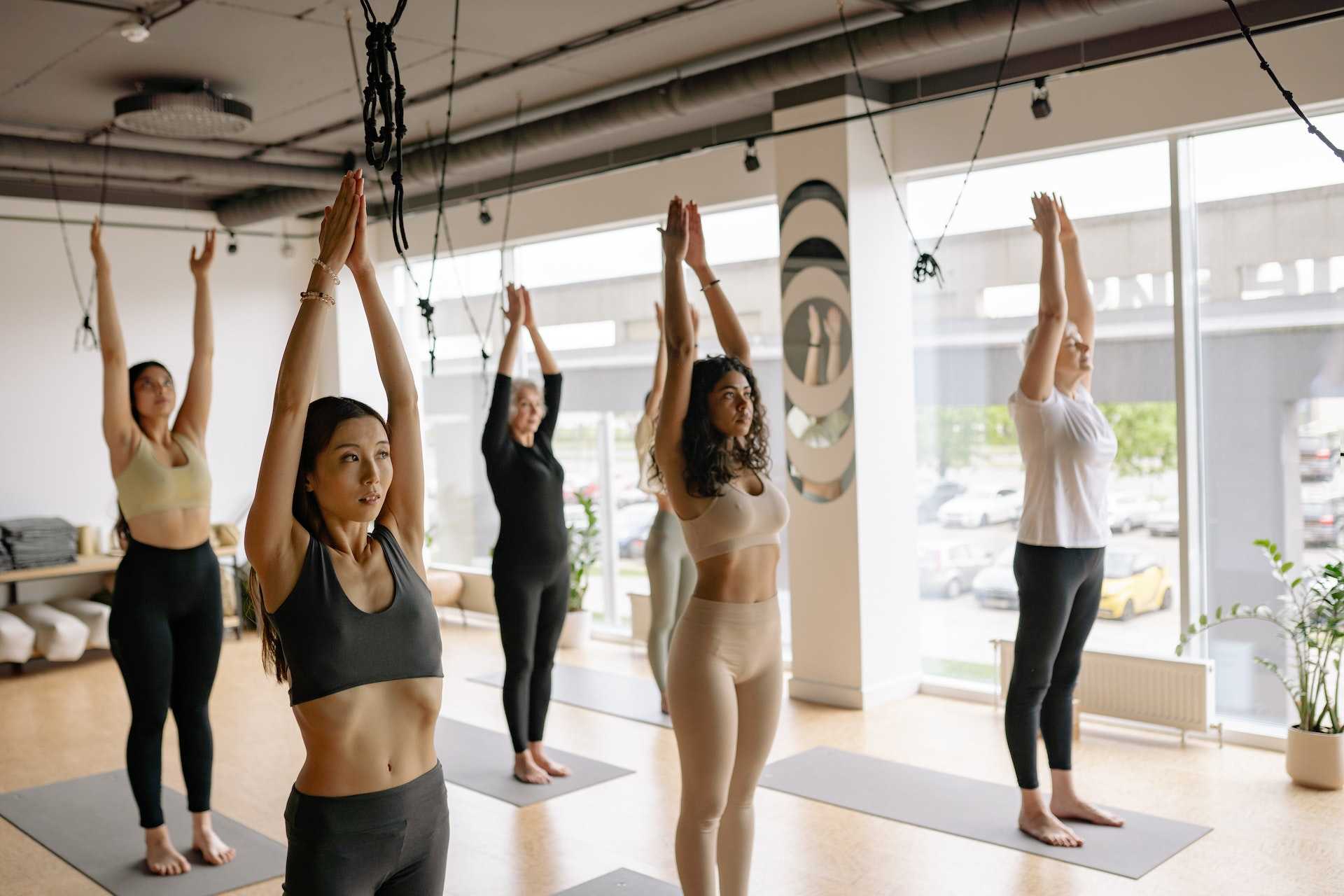Developing the habit of a yoga practice is a wonderful way to improve your mental and physical health.
While you can technically practice yoga in any clothes you’d like, there are benefits to wearing certain fabrics and styles for your practice.
With improper clothing, you may find that your movements are restricted or uncomfortable, you may experience chafing, buttons and zippers can poke you, the hems might not stay in place, and the fabric may not feel comfortable if you work up a sweat.
So, it’s important to make sure your clothes contribute to a comfortable and well-rounded yoga practice.

Best Fabrics for Yoga Clothes
Not all cloth is created equally.
It’s important to consider the effectiveness of the material for your body while practicing yoga as well as the safety of the material and its environmental impacts.
After all, yoga is a practice in the art of consideration and harmony; it’s important to make choices that are less harmful to the world you are practicing yoga in.
Nylon/Polyester/Rayon/Viscose/Lycra
Pros: Soft and silky, stretchy, moisture-wicking
Cons: Synthetic material that takes a lot of energy to produce, made of petrochemicals and/or unsustainable wood fibers, non-biodegradable, makes micro-plastic pollution every time it’s washed
If you choose these types of clothing, see if you can find a good-quality used item to extend the life of that item of clothing. Or, try to keep and use your nylon items for as long as possible, or hand them down to someone else who can use them. Synthetic material is popular among people who do a lot of rigorous physical activity because it can protect the body from chafing. It is tight and form-fitting so your tops and bottoms won’t flip over if you go upside down.
Nylon is resistant to bacterial and fungal growth which means it’s more smell-resistant, but the other materials may hold bacteria and get smelly.
Cotton
Pros: Natural material, biodegradable, loose-fitting
Cons: Possibly cause chafing, non-organic uses many pesticides when growing, water-intensive crop, holds sweat, loose-fitting
Cotton typically comes in looser-fitting styles which means you can be comfortable not showing your body off, but you may run the risk of having your clothes fall out of place if you invert. Non-organic cotton uses a lot of harmful pesticides that damage the environment, the workers, and you when you wear trace amounts of pesticide residue. Many people dislike that cotton stays wet for a long time after absorbing sweat. Dyed cotton may have harmful chemicals in it as well. It’s best to go for undyed, organic cotton.
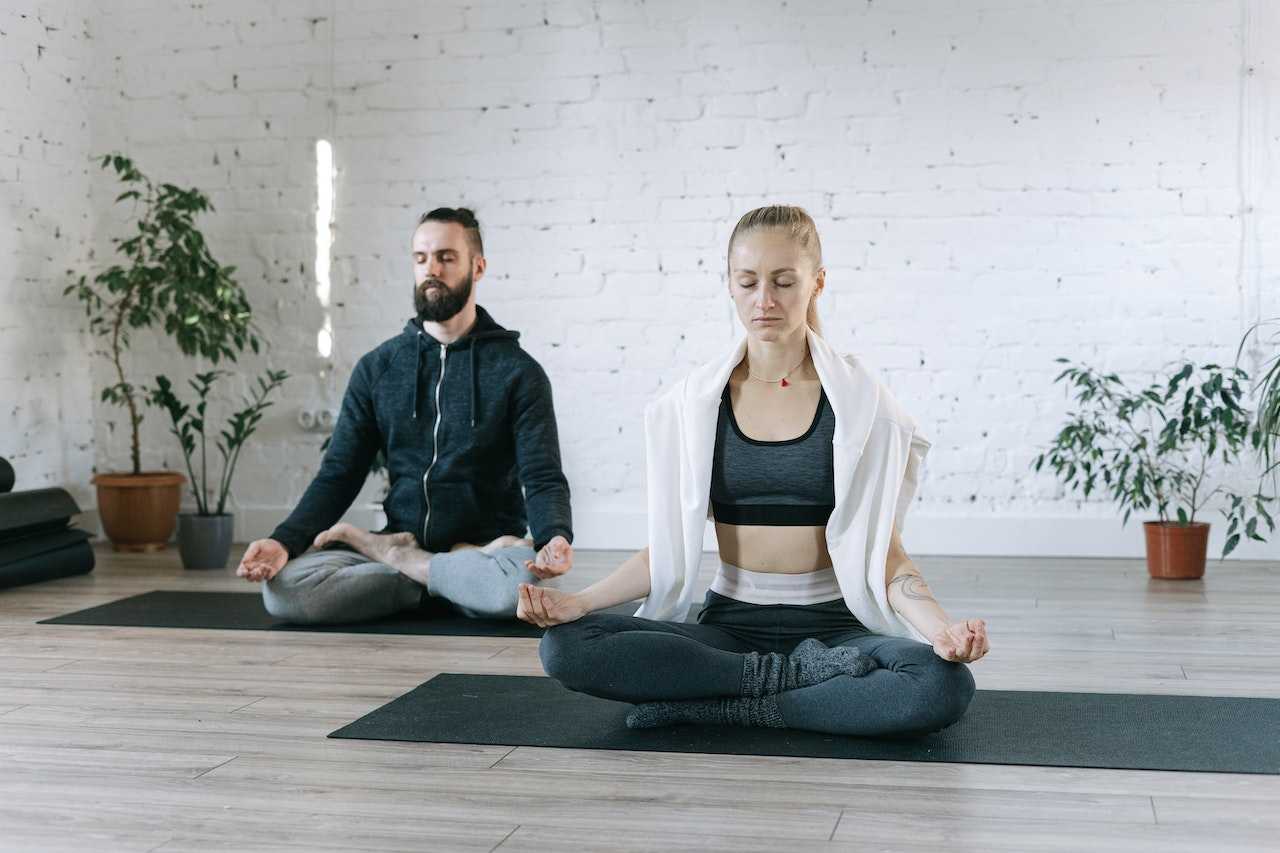
Bamboo
Pros: Less energy and resources required to grow, harvest, and create the material, good for sensitive skin, moisture-wicking
Cons: Tends to be more expensive, can shrink over time, some bamboo treatments may use toxic chemicals
Bamboo is a newer material still lesser-used in the sportswear world, making it a more expensive choice. However, it is a very sturdy material that will last for many wears and washes, making it a great long-term investment. It helps keep the wearer dryer and cooler in humid environments, perfect for strenuous yoga.
Hemp
Pros: Highly durable, lightweight, moisture-wicking, breathable, hemp plants add nutrients to soil and is carbon negative
Cons: Feels textured/can feel rough, can be expensive, wrinkles easily
Hemp is a plant that has been used for thousands of years to make all sorts of materials. It is only in the past 50 - 100 years that Western countries feared that agricultural hemp could be used as a drug and thusly was outlawed. Because of this connotation, some hemp clothes can be more expensive due to lower market supply.
When I did hatha yoga as a young boy, the only thing we were allowed to wear was a small loincloth. The idea was that there should be as little obstruction as possible. -Sadhguru
Silk
Pros: Doesn’t use pesticides, extremely soft and comfortable, thermoregulates the body and wicks moisture, is biodegradable
Cons: Not cruelty-free (6500 silkworms must be killed for 1 kg of fabric), expensive, many silk factories utilize child labor, silk facilities require large amounts of water and energy
While silk is a traditional and luxurious material that makes a great cooling and moisture-wicking fabric, it comes with many downsides including child labor, unsafe working conditions, and the killing of millions of silkworms per year. Be aware also that synthetic silk is typically made of rayon.
Linen
Pros: Keeps you cool, breathable, moisture-wicking, durable, naturally anti-microbial, can be grown without pesticides, renewable resource (flax), biodegradable
Cons: Wrinkles easily and can tear at wrinkle-points over time, can shrink with improper care, may lead to chafing, can be expensive
Linen is one of the most renewable and environmentally-friendly textiles available. It provides a comfortable temperature for the wearer even if they are working up a sweat. As a natural textile, it is easy to feel more connected to the earth when wearing linen.
There sure are a lot of different types of cloth to choose from! Many are blends of the fabrics listed above. Try to stick to clothing that is well-made so you can wear it for many years (some cotton and hemp clothing can last longer than 20 years!). The most important factor when choosing yoga clothes is that you will be comfortable with how the material feels and that it allows you to move freely.
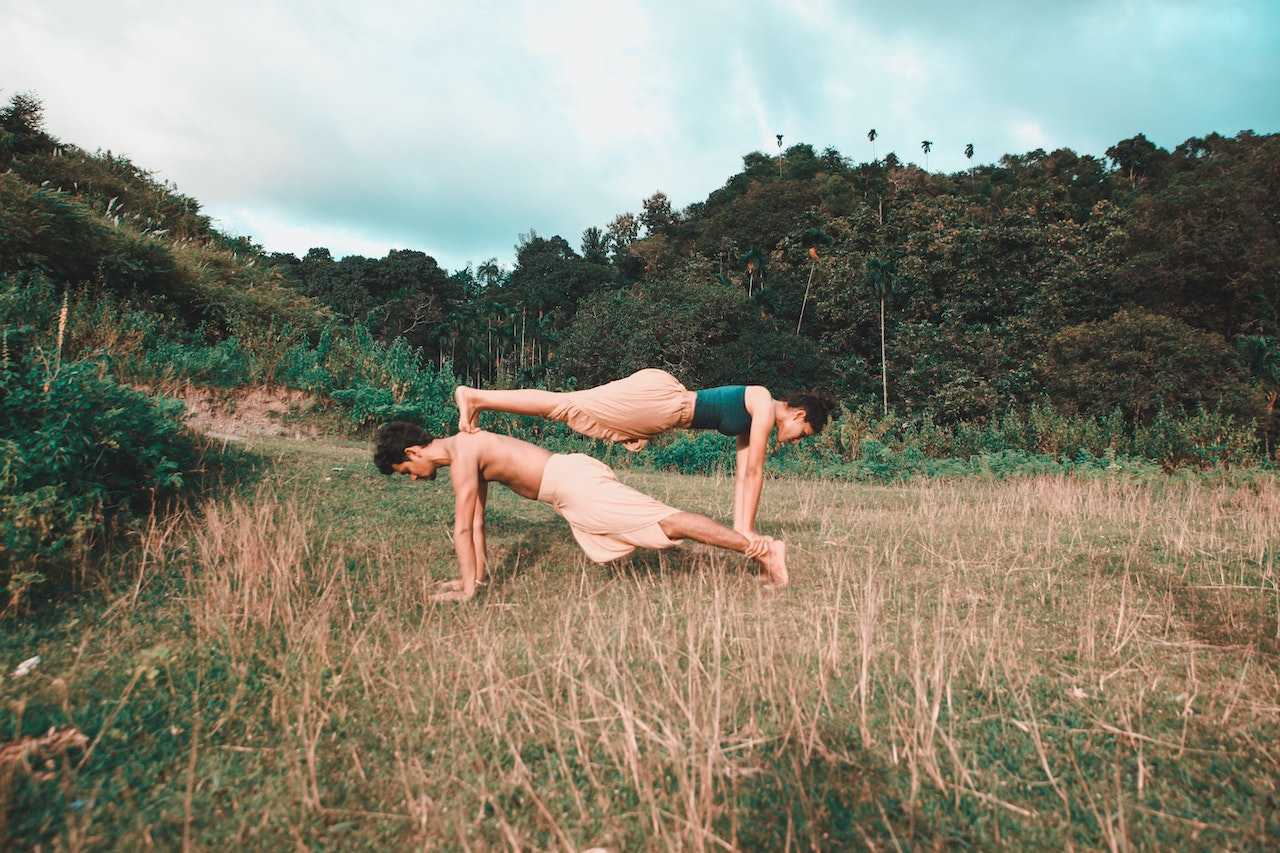
Modern Clothing Styles for Yoga
Modern yoga styles tend to be very tight. There is actually a reason for this!
Traditional yoga clothing consisted of just a loincloth (when men were the only practitioners) and evolved into “yoga bloomers” with a t-shirt later on. The clothing, or lack thereof, was a way for the yogi to be unencumbered while practicing physical and spiritual exercise. It also allowed the yoga teacher to see the student’s alignment in their joints more easily.
As the years passed, yoga clothes became more modest to make the practice more approachable to new audiences. For many, the traditional clothing style became more loose-fitting so as to not reveal too much skin or body shape.
In the modern age, people tend to want to show less skin but are less hesitant to show body shape. Tight yoga clothes allow the teacher to see the student’s alignment. They also allow the student to move comfortably with stretchy materials, reducing friction in places like the groin and armpits as well as against the ground, and tight clothes don’t roll up in handstand.
It’s your choice if you want to wear modern or traditional clothing styles to your yoga classes. Here are some of the most popular modern clothing styles for yoga classes.
Tops
The most popular modern styles of tops for active yoga are t-shirts, sleeveless shirts, and cropped tops.
If you are practicing a slow style of yoga, like yin, or in a colder climate where you might get chilly during your session, you might bring a shawl or pullover for warmth.
When choosing a yoga top, be mindful to avoid things like zippers, buttons, and knots that can poke you!
Bottoms
Of course, you may know that yoga pants are the most common modern clothing item for yoga. Tight, stretchy bottoms (like churidar or leggings) are popular among women, but many men wear them as well. Many women also wear palazzo/salwar/harem-style yoga bottoms when they will not be inverting.
For men, many choose either looser athletic pants or shorts.
Both men and women often wear tighter, stretchy shorts in more active and sweaty yoga classes.
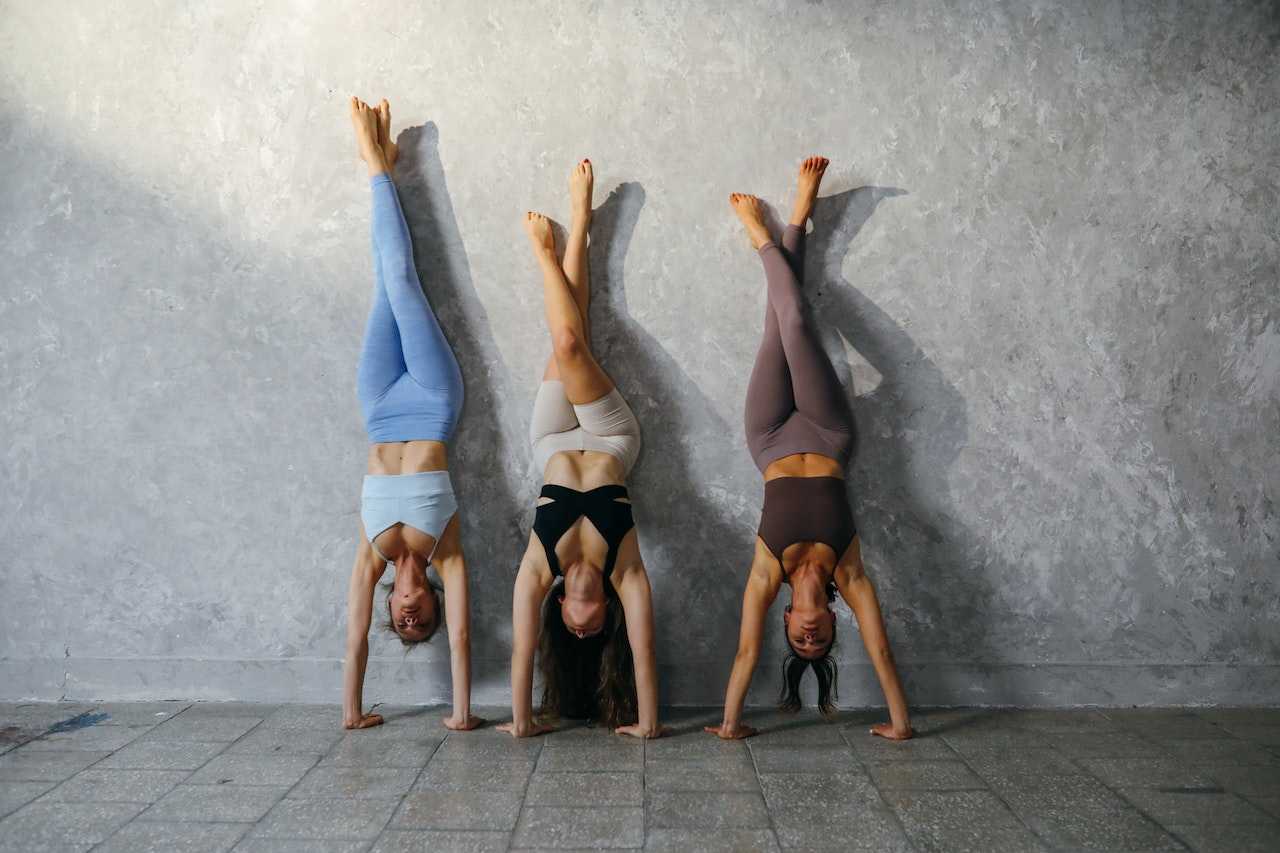
Undergarments
The style of undergarment you wear is entirely your choice, but it’s a good idea to wear pure cotton especially if you are wearing tight synthetic bottoms.
This is for health reasons, and you certainly don’t want to cause a bacterial or fungal problem for yourself during your yoga practice!
For women, investing in a comfortable athletic bra may be a good decision. Especially if you are performing yoga with quick movements, you may find it beneficial to hold the chest in one place. Depending on your preference, size, and activity, you can look for low-impact, medium-impact, and high-impact athletic bras.
Most sports bras are made of synthetic material so they can stretch and contain the chest. You should always wear a bra with a wide shoulder strap that does not dig into the skin on the shoulders. And make sure your athletic bra does not have underwire which can press and poke you!
If you’re not in favor of bras, that’s ok too! There is some data to suggest that wearing bras can inhibit lymph fluid movement and weaken Cooper’s ligaments. A too-tight bra can even constrict blood flow. Ultimately, it’s up to you if you want to wear an athletic bra in yoga class.
Socks
Most people practice yoga barefoot as it allows for a firm connection to the mat and more closeness to the earth. However, if you need to wear socks, there are a few choices.
You might like to invest in grippy socks, which have small dabs of rubber-like material on the bottom to help you avoid slipping. These are good when you don’t have a yoga mat or if your feet are cold.
In situations where your feet may be cold and you don’t need to stand, try bringing a pair of thick socks or slippers with you for savasana.

Traditional Clothing for Yoga
As mentioned above, traditional yoga clothing has gone through a few phases, starting with loincloths or nude, to “yoga bloomers” and t-shirts, to more conservative and flowy wear.
Many people who choose traditional yoga clothes opt for the last option. Unless you’re in a specific ashram that allows the wearing of loincloths, it may be rather inappropriate to show up at a yoga class wearing one. But at home, you can wear whatever you like!
Many yoga teachers promote the idea of wearing looser, traditional clothing as it allows for easier breathing. Tight clothes may inhibit natural and free-flowing breath, whether physically or energetically.
Dhoti
Many practitioners wear dhoti (both traditional, unstitched style and pre-made style) during yoga. Many men practice without a shirt, wearing only the dhoti. Others pair the dhoti with a kurta.
Women can wear dhoti, though it is a style that is more traditional for men.
Saree
While it may seem impractical or even impossible to practice yoga while wearing saree, with some practice, it’s actually quite simple! There are ways to fold the saree to allow for the legs to move freely without the saree coming loose.
There are also many asanas that can be performed in a saree without needing any special draping at all.
Kurta
Perfect for both men and women, the kurta allows the yogi to comfortably practice any asana. All you need to ensure is that the material is suitable and the size is large enough for you to be able to move your arms around at any angle comfortably.
Best Yoga Accessories
If you want to invest more into your yoga outfit, there are a few functional accessories you may like to incorporate.
Hair Ties
Getting a good quality and effective hair tie is important if you have long hair. Keeping your strands out of your face is important for your focus (and it never helps to get poked in the eye or have a hair go up your nostril).
Sweat Bands
If you don’t enjoy the feeling of sweat running down your face or body, you might like to get a sweatband for your forehead, upper arms, or wrists. If your clothing doesn’t wick the sweat away, your sweatband can!
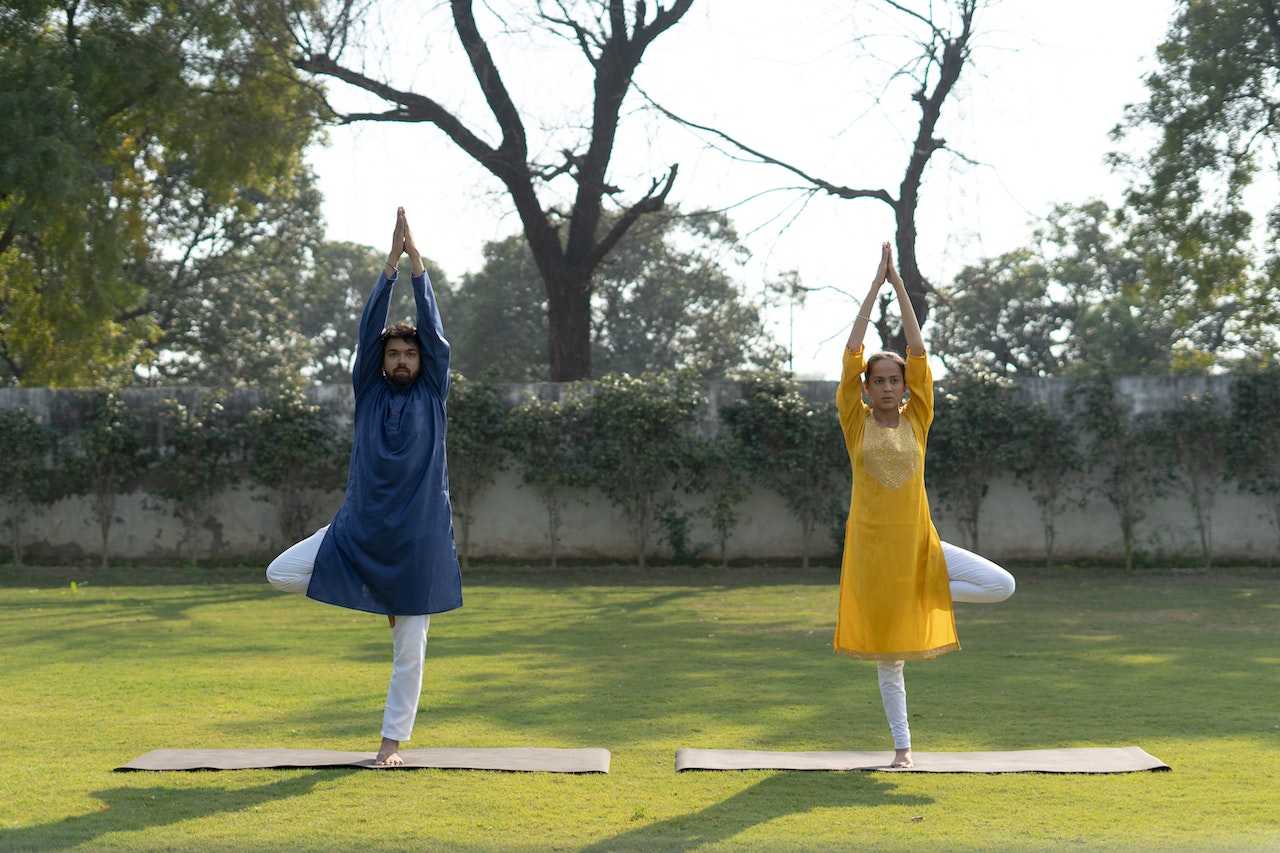
Best Yoga Outfits for Men & Women
So, what are the actual best outfits for practicing yoga? Most yoga studios will expect you to dress in a relatively modest way, meaning not much skin showing.
Some studios or ashrams may allow a more free dress code, as they do not allow sexualization of the skin.
And as always, you can wear whatever you like at home!
Modern Yoga Outfits for Women
For some inspiration, check out these chic yoga outfit ideas!
Comfort Classic
- T-shirt
- Churidar
Modern Chic
- Matching sports bra and leggings
- Off-the-shoulder top
Boho Flow
- Stylish sports bra
- Sleeveless shirt
- Shruggie shawl
- Harem bottoms
Modern Yoga Outfits for Men
There are lots of different yoga outfit ideas for men!
No Frills
- Cotton t-shirt
- Harem bottoms
The Athlete
- Sleeveless top
- Shorts
Take It Easy
- T-shirt
- Churidar
- Shawl
Traditional Yoga Outfit for Yogis
Want to stick to a more traditional outfit? Here are the most popular:
- Kurta over salwar or churidar
- Kurta over dhoti
- For women: Saree draped like dhoti
- For men: Dhoti with no shirt
What to Wear at the Best Yoga Retreats in India
Most yoga retreat centers in India cater to a Western audience, meaning they anticipate guests will be wearing Western-style yoga clothes, which largely consist of thin-strapped tops and yoga pants.
All this means is that if you want to wear clothes that are more revealing, this is a safe place to do so! Westerners are more used to having the freedom to wear tops that show their bellies and tight clothes while participating in practices like Yoga and being on holiday or vacation.
But if you want to use the time at a retreat to embrace what it feels like to wear traditional garb while practicing yoga, you can do that as well!
Retreats are meant to allow you to immerse yourself in yoga and explore your personal relationship with the practice.
Some of the most popular retreats in India are
- Agnihotra Yoga Retreat in Kerala
- Hinterland Village in Kerala
- YogaMagic Eco Retreat in Goa
- Sarvaguna Yoga in Dharamsala and Goa
- Anand Yoga Village in Goa
- Veda5 in Goa, Rishikesh, and Kerala
- AyurYoga Eco Ashram in Karnataka
Now that you know more about fabrics and fits, what do you think you’ll be wearing to your next yoga class?
Summarise with AI:

